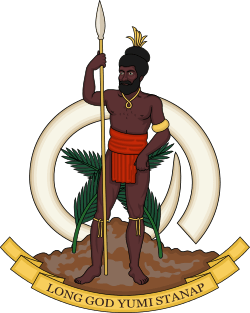Vanua'aku Pati
Vanua'aku Pati | |
|---|---|
| Leader | Joe Natuman (interim) |
| Founded | 17 August 1971 |
| Ideology |
Melanesian socialism Democratic socialism Anglophone Ni-Vanuatu Nationalist |
| Political position | Left-wing |
| Parliament |
6 / 52 |
 |
| This article is part of a series on the politics and government of Vanuatu |
The Vanua'aku Pati (rough translation: Our Land Party)[1] is a democratic socialist political party in Vanuatu. At the last general election, held on 22 January 2016, they received 11.91% of the vote and 6 seats. They supported the election of Charlot Salwai as Prime Minister.[2]
History
The party was founded in 17 August 1971 by Walter Lini as the New Hebridean Cultural Association, renamed later that same year as the New Hebrides National Party, and was one of two parties formed during the country's move towards independence. While the NHNP was supported by British interests, the Union of New Hebrides Communities was supported by French interests. It went on to win the 1975 elections and in 1977 it was renamed the Vanua'aku Pati.[3] The party won the pre-independence 1979 elections and Lini became chief minister. The country gained independence in 1980 and Lini became the first Prime Minister of Vanuatu, remaining in the post until 1991. In 1991 the party split, and Lini was among those who left the party.
After the 1991 elections, the party lost its dominance over the government. Despite this, the party remained strong. During the next decade, as party members Donald Kalpokas and Edward Natapei served as prime ministers of Vanuatu. The party began steadily losing seats in the early 2000s; it took 18 in the 1998 elections, 14 in the 2002 elections, and 8 in the 2004 elections, a setback which forced Prime Minister Natapei to resign. The party suffered another split after the elections, as the leadership refused to support the national coalition government of Serge Vohor while two Vanua'aku Party representatives supported this government, allowing it to take office. However, after a controversy over the diplomatic recognition of Taiwan and China, the Vanua'aku Party reunited in December 2004 and was involved in the effort to oust Vohor. It remained influential, and was a key supporter of the National United Party government of Walter Lini's brother Ham Lini which lasted from December 2004 through the September 2008 elections. After a short break from participation in the coalition government, the party returned in July 2007 when its leader, former Prime Minister Edward Natapei, became deputy prime minister. The party had a strong result in the September 2008 elections, gaining 11 of the 52 results, making this party the largest one in Parliament and allowing Natapei to return as prime minister.
After multiple attempts to remove Natapei, he was forced out by a vote of no confidence on 2 December 2010, replaced by opposition leader Sato Kilman.[4] Natapei was temporarily reinstated on 16 June 2011 when the Supreme Court of Vanuatu ruled Kilman's election as prime minister violated the Vanuatu constitution. A new election was held on 26 June of that year, in which Kilman was reinstated.
The party lost three seats in the parliamentary elections of 30 October 2012; however, it remained the largest single party in parliament.[5]
The name of the Vanua'aku Party means "Party of Our land" in English (from the word vanua). It supports socialist economic policies and is mostly supported by English speakers.
References
- ↑ "Vanuatu lawmakers elect Natapei as prime minister". Associated Press. International Herald Tribune. 2008-09-22. Retrieved 2008-09-22.
- ↑ "New prime minister for Vanuatu". Radio New Zealand. Retrieved 2016-03-04.
- ↑ "The political parties and groupings of Vanuatu" (PDF). August 2008. Retrieved 10 October 2016.
- ↑ "Vanuatu's Natapei ousted in no confidence challenge". radionz.co.nz. 2010-12-03. Retrieved 2015-07-29.
- ↑ "Republic of Vanuatu Election for Parliament". International Foundation for Electoral Systems. Retrieved 2015-07-29.